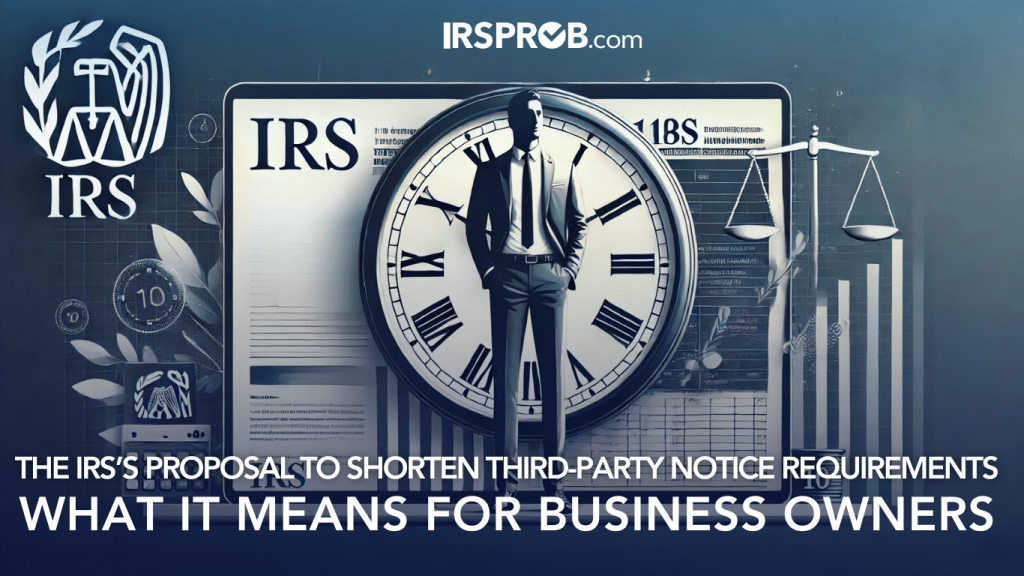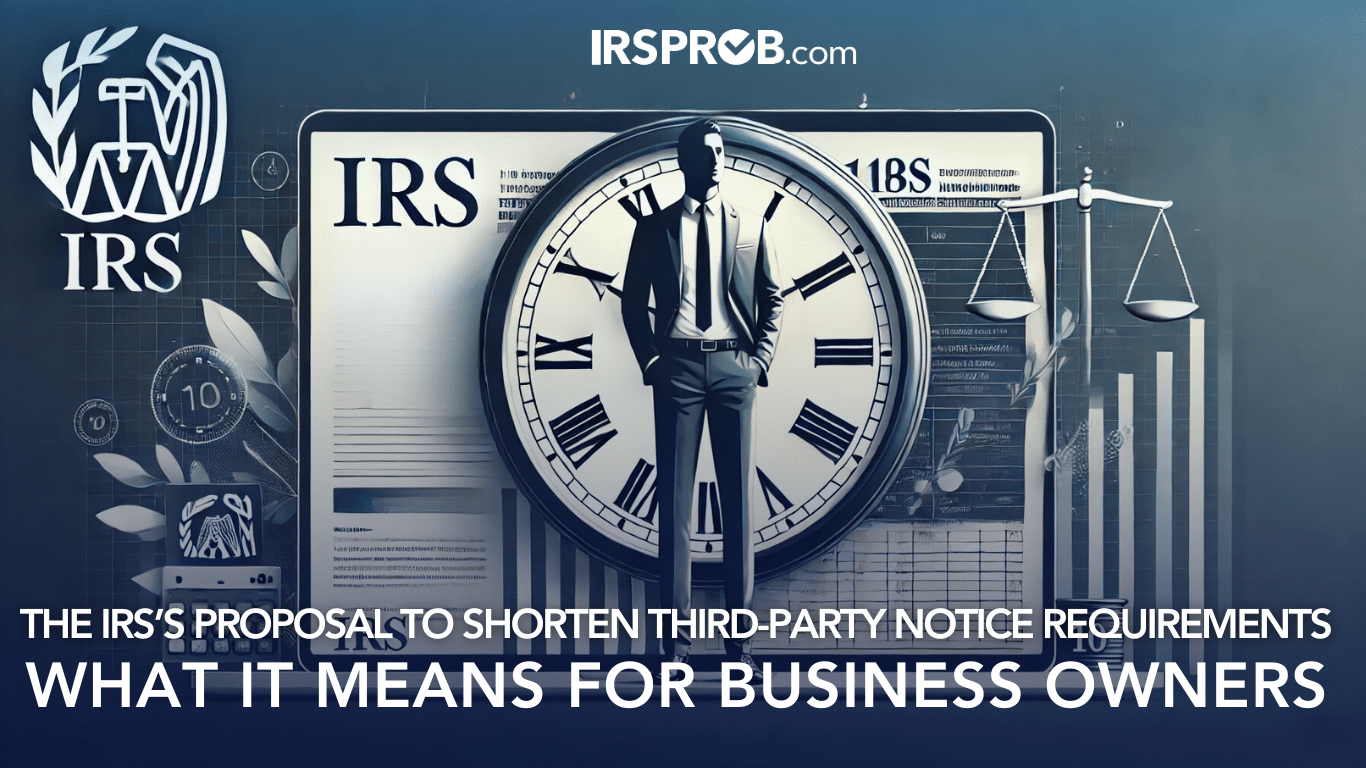
The IRS’s recent proposal to shorten the third-party notice requirement from 45 days to just 10 days is raising concerns about taxpayer rights and the potential erosion of due process. National Taxpayer Advocate Erin Collins has spoken out against this proposed change, arguing that it may unfairly impact taxpayers, particularly small business owners, by limiting their time to respond when the IRS intends to involve third parties in its efforts to assess or collect taxes.
Let’s break down what these proposed changes mean, why they’re controversial, and how business owners should prepare.
Understanding Third-Party Notice Requirements
Under current rules, the IRS is required to give taxpayers a 45-day notice before contacting third parties—such as accountants, business partners, or vendors—to gather information. This requirement was established by the IRS Restructuring and Reform Act of 1998 and further strengthened by the Taxpayer First Act of 2019, which replaced a “reasonable notice” standard with a clear 45-day notice period.
The goal was to protect taxpayers’ privacy and ensure they have adequate time to address IRS concerns directly, without having to deal with the fallout of third-party involvement unnecessarily. There are a few statutory exceptions to the 45-day rule:
- When the taxpayer authorizes the contact,
- When giving notice would jeopardize tax collection or put someone at risk of reprisal, or
- In cases related to pending criminal investigations.
These exceptions allow the IRS some flexibility, while preserving taxpayer rights in the vast majority of cases.
What the New Proposal Entails
The proposed regulation would allow the IRS to reduce the 45-day notice period to just 10 days in specific situations. This would apply primarily when the IRS is nearing the end of the statute of limitations—generally within one year of expiration—on either assessing additional tax or collecting an unpaid debt. For example, if the IRS has requested an extension on the statute of limitations but the taxpayer refuses to agree, the agency could shorten the notification period to 10 days. Similarly, if the IRS plans to ask the Justice Department to file suit to collect overdue taxes or foreclose on a federal tax lien, it could issue a shortened 10-day notice to the taxpayer.
Potential Impacts on Business Owners
For business owners, this proposed change could have significant implications:
- Reduced Time to Prepare: The shortened notice period limits the time available to business owners to resolve tax issues directly or to gather documentation that could prevent IRS escalation. A rushed process could lead to unintended mistakes, miscommunication, or missed deadlines.
- Privacy Concerns: Having third parties—such as key vendors or stakeholders—involved in IRS matters could damage business relationships and, in some cases, harm the business’s reputation.
- Increased Stress on Business Operations: For small business owners, managing tax disputes or IRS inquiries on short notice can disrupt day-to-day operations, taking time away from critical business functions.
- Limited Appeal Options: If a business owner needs to seek legal or accounting advice in response to the IRS’s intended actions, the 10-day period may make it challenging to coordinate with professionals and prepare an adequate defense.
The Right to Finality and the Importance of the Statute of Limitations
One of the key concerns raised by Erin Collins is the potential erosion of the taxpayer’s “right to finality.” The IRS generally has three years to assess additional tax and ten years to collect on any unpaid balances. For business owners, the statute of limitations provides a definitive timeline, so they know when they are “in the clear.”
The proposed regulation risks undermining this right, allowing the IRS to accelerate its processes near the end of the statute of limitations period, even in cases where delays in assessment were beyond the taxpayer’s control.
What Business Owners Should Do
While the proposal is still in the regulatory review phase, it’s essential for business owners to remain vigilant and proactive:
- Maintain Up-to-Date Records: Ensure your tax records and supporting documents are well-organized and readily accessible. Accurate records can serve as a buffer if the IRS questions your tax filings or if quick responses become necessary.
- Stay Aware of IRS Correspondence: Watch for any communications from the IRS, especially notices related to statute limitations and requests for extensions. If you receive an extension request, weigh your options carefully and consider consulting a tax advisor before agreeing.
- Communicate with Tax Professionals: Establish a relationship with a tax advisor who can respond quickly to any IRS inquiries. If you’re approached by the IRS about statute of limitations issues, having an advisor who understands your business and can advocate for you is invaluable.
- Monitor Regulatory Updates: While this proposal is not yet law, it’s wise to stay informed about changes that could affect your rights. Updates from the IRS and the National Taxpayer Advocate’s office can provide valuable insights into how to navigate your obligations.
Advocating for Taxpayer Rights
The response to this proposal highlights a broader concern within the business community about taxpayer rights and due process. While the IRS has a responsibility to collect taxes owed, it also has an obligation to respect taxpayer protections. The IRS should carefully consider the balance between efficient tax collection and preserving taxpayers’ rights to privacy, due process, and finality.
The proposed regulation’s shorter notice period may ultimately hinder rather than help efficient tax collection, as it could prompt taxpayer resistance and create more disputes. Business owners, taxpayers, and advocates are urging the IRS to reconsider this rule and maintain the existing 45-day notice requirement, allowing sufficient time for all parties to resolve matters equitably and without undue haste.
Final Takeaway
For business owners, this proposal serves as a reminder of the importance of proactive tax management and staying informed about regulatory changes. The 45-day notice provides valuable time for business owners to address IRS issues directly and avoid third-party complications. As regulations evolve, being prepared can be the best defense in safeguarding your business’s operations, reputation, and financial stability.








